动词三单的变化规则及练习
动词三单变化规则与练习69643教程文件

动词三单变化规则与练习69643哪些主语是第三人称单数? 现归纳总结如下:一、人称代词he, she, it是第三人称单数。
如:He likes watching TV. 他喜欢看电视。
he has lunch at twelve. 她十二点吃午餐。
It looks like a cat. 它看起来像只猫。
二、单个人名、地名或称呼作主语;是第三人称单数。
如:①Han Mei looks like her mother. 韩梅看起来像她的母亲。
②Beijing is in China. 北京在中国。
③Uncle Wang often makes cakes. 王叔叔经常做蛋糕。
Bob does his homework every day. 鲍勃每天都做家庭作业三、单数名词或"this / that / the+单数可数名词"作主语时,是第三人称单数。
如:②This book is yours. 这本书是你的。
③That car is red. 那辆小汽车是红色的。
④The cat is Lucy's. 这只猫是露茜的。
四指示代词this,that作主语时,是第三人称单数。
如:③This is a pen. 这是一支钢笔。
④That is an eraser. 那是一块橡皮擦。
动词第三人称单数的变化规则1、直接在动词后+slike- like s play-plays2、以s, x, sh, ch, 接尾的动词+es wash-wash es3、以辅音+o接尾的动词:+esgo-go es收集于网络,如有侵权请联系管理员删除4、以辅音+y接尾的动词:变y为i+esf ly-f lies stud y →stud ies注意:(动词三单特殊形式)go→goes,do→doeshave→has be→is巩固练习题:(三单形式)1.work_______2. watch_________3. clean________4. write_______5. teach_______6. wash__________7. have_______8.read________9. go__________10. do__________11. fly________12. study_______13.She ---------- (watch) TV.I ---------- (watch) TV.I 写出动词的第三人称单数work________read_______clean______write______teach_______guess______watch______study________cry________play______have______match ______finish______carry______say________go________do ________play ________jump ________swim________run________put________sing ________dance________come________get ________have ________fly ________study________read________write ________look________drink ________eat ________walk ________like ________收集于网络,如有侵权请联系管理员删除二.填空:1.She ______(do) homework by herself.2.Jack ______(go) home by bike.3.The giant______(climb) up the beanstalk.4.Her mum ______(run) to the goose.5.He______(do not)like apple.6,Sam______(put) it under his arm.7.The boy_______(chase) it.8.Kitty______(watch)TV everyday.9.He______(feed)them at 8:00 in the morning.11.Grandma Wang___(live) in Pudong.12.The girls___(give) the key to Grandpa.13.That key ______(open) the old box.14.She ______(say) “I like these puppets”.17.He doesn’t______(know)her name.18.John can’t_______(find) his watch.19.Where _____(do)Grandma live?20.How does he______(go)to the post office?收集于网络,如有侵权请联系管理员删除。
动词第三人称单数的变化规则及练习
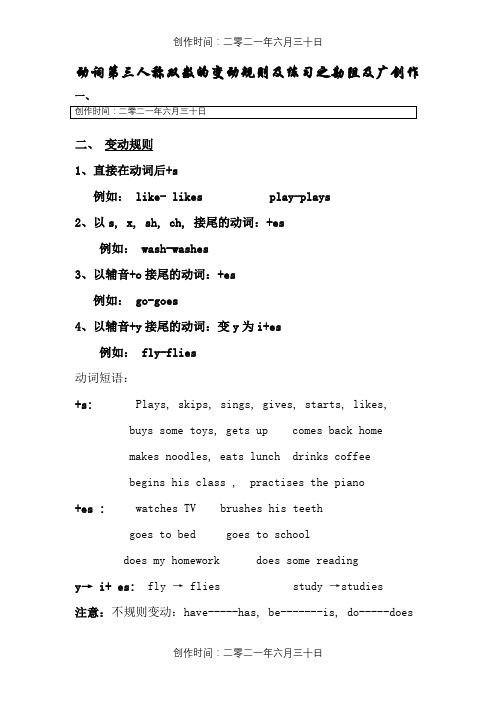
动词第三人称双数的变动规则及练习之勘阻及广创作一、二、变动规则1、直接在动词后+s例如: like- likes play-plays2、以s, x, sh, ch, 接尾的动词:+es例如: wash-washes3、以辅音+o接尾的动词:+es例如: go-goes4、以辅音+y接尾的动词:变y为i+es例如: fly-flies动词短语:+s: Plays, skips, sings, gives, starts, likes,buys some toys, gets up comes back homemakes noodles, eats lunch drinks coffeebegins his class , practises the piano+es : watches TV brushes his teethgoes to bed goes to schooldoes my homework does some readingy→ i+ es:fly → flies study →studies注意:不规则变动:have-----has, be-------is, do-----does写出下列动词的第三人称双数drink ________ go _______ stay ________ make ________ look _________ have_______ pass_______ carry ____ come________ watch______ plant_______ fly ________ study_______ brush________ do_________ teach_______二、请看下面两组句子, 注意区分他们的共同点和分歧点.I go to school every day.I don't go to school every day.He goes to school every day.He doesn't go to school every day.Do you go to school every day?Yes, I do. (No, I don't)Does he go to school every day?Yes, he does. (No, he doesn't)注:1)第三人称双数用了 does 后面就不用动词的s形式了,而用动词原形..2)酿成疑问句,要在句首加"do" does ; 酿成否定句, 要在动词前面加"do not ,does not", 可以简写为 "don't", doesn’t.课堂练习一一、把下列句子改成一般疑问句并做肯定、否定回答.1.I usually get up at six o’clock.Do you usually get up at six ?Yes, I do . /No, I don’t .2. We usually write e-mails on Saturday evening?Yes, No,3. They have the same hobby.?Yes, No,4. Suhai and Su yang like listening to music after school.?Yes, No,5. Helen usually watches TV in the evening.?Yes, No,二、否定句:在动词前+doesn't或don't.1. She_____ _____(do)her homework every day.2. He_____ _____(live)in Huanggang.3. The girl_____ _____(look)out of the window and sees many birds in the sky.4. Jenny runs home and_____ _____(sit)on the chair.三、一般疑问句:1._____the desk_____(have)four legs? Yes, it does.2._____she____(do)her homework every day?Yes, she does.3._____he_____(live)in Huanggang? No, he doesn't.4. Does Danny_____(see)the apple tree?四、依照要求改写句子:1. I do my homework every day.(改为一般疑问句, 作否定回答) ________________________________________________________2. She likes milk.(改为一般疑问句, 作肯定回答) ____________________________________________________________3. Amy likes playing computer games.(改为一般疑问句, 作否定回答) ___________________________________________________4. We go to school every morning.(改为否定句) _______________________________________________________5. I like taking photos in the park.(对划线部份提问) ________________________________________________________6. John comes from Canada.(对划线部份提问) ___________________________________________________7. Simon and Daniel like going skating.(改为否定句) ___________________________________________________五、改错(划犯毛病的处所, 将正确的写在横线上)1. Is your brother speak English? __________________2. Does he like going fishing? __________________3. He likes play games after class. __________________4. Mr. Wu teaches us English. _________________ _5. She doesn’t do her homework on Sundays. _________________课堂练习二一、写出所给词的第三人称双数形式sit swim read make runwrite havego do watch cry study play say wash二、用do或does的适当形式填空1. _____ you ride a bike to school? Yes, I ________.2. ______ your sister like PE? No, she ________.3. What_______ the students have? They have some pens.4. How_______ Linda go to school? She goes to school onfoot.5. He _______ not speak English. He speaks Chinese.6. _______ they watch TV on Sundays? Yes, they _______.7. My father and mother ______ not read newspapers on Saturday.三、句型转换1. I go to school by bus. (用He做主语变否定句)________________________________________2. Kim plays baseball very well. (变一般疑问句)________________________________________3. David doesn’t like learning French. (变肯定句)________________________________________4. Alan doesn’t watch TV on school nights. (变肯定句) ________________________________________5. We have enough time to do it. (变否定句)________________________________________6. Snoopy has a car. (对划线部份提问)______________________________________________________________ 7. Do you have a pencil? (把主语改成she)________________________________________________________________四、动词的适当形式填空Jim’s father (work) in a bank.He (go) to work by bus every morning, sometimeshe (ride) his bike.But he (be) never late for work. He (work) very hard.Jim (like) his father very much. They often (play)badminton(羽毛球)in front of their house, sometimes they (play) table tennis in Jim’sschool.Jim (like) to talk with his father. His father (like) to hear Jim talking about his friends and hisschool. On Saturday or Sunday, they often (play)on the computer. Jim (have) many computergames. But he doesn’t (play) them every day. Healso (work) hard at his lessons.。
动词第三人称单数的变化规则及练习备课讲稿

动词第三人称单数的变化规则及练习动词第三人称单数的变化规则及练习一、变化规则1、直接在动词后+s例如: like- likes play-plays2、以s, x, sh, ch, 接尾的动词:+es例如: wash-washes3、以辅音+o接尾的动词:+es例如: go-goes4、以辅音+y接尾的动词:变y为i+es例如: fly-flies动词短语:+s: Plays, skips, sings, gives, starts, likes,buys some toys, gets up comes back homemakes noodles, eats lunch drinks coffeebegins his class , practises the piano+es : watches TV brushes his teethgoes to bed goes to schooldoes my homework does some readingy→ i+ es:fly → flies study →studies注意:不规则变化:have-----has,be-------is,do-----does写出下列动词的第三人称单数drink ________ go _______ stay ________ make ________look _________ have_______ pass_______ carry ____come________ watch______ plant_______ fly ________study_______ brush________ do_________ teach_______二、请看下面两组句子,注意区分他们的共同点和不同点。
I go to school every day.I don't go to school every day.He goes to school every day.He doesn't go to school every day.Do you go to school every day?Yes, I do. (No, I don't)Does he go to school every day?Yes, he does. (No, he doesn't)注:1)第三人称单数用了 does 后面就不用动词的s形式了,而用动词原形.。
动词第三人称单数的变化规则及练习
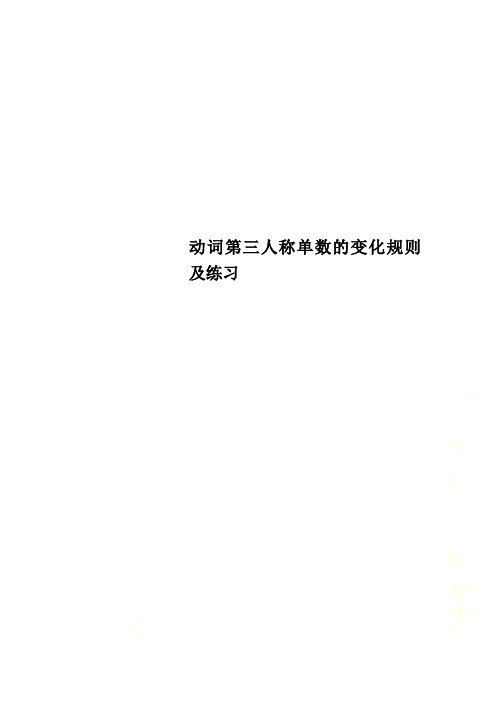
动词第三人称单数的变化规则及练习动词第三人称单数的变化规则及练习一、变化规则1、直接在动词后+s例如:like- likes play-plays 2、以s, x, sh, ch, 接尾的动词:+es例如:wash-washes3、以辅音+o接尾的动词:+es例如:go-goes4、以辅音+y接尾的动词:变y为i+es例如:fly-flies动词短语:+s: Plays, skips, sings, gives, starts, likes,buys some toys, gets up comes back homemakes noodles, eats lunch drinks coffeebegins his class , practices the piano+es : watches TV brushes his teethgoes to bed goes to schooldoes my homework does some readingy→ i+ es: fly → flies study →studies注意:不规则变化:have-----has,be-------is,do-----does写出下列动词的第三人称单数drink ________ go _______ stay ________ make ________look_________ have_______ pass_______ carry_____come________ watch______plant_______ fly ________study_______brush________do_________ teach_______practice_______否定回答。
1.I usually get up at six o’clock.Do you usually get up at six ?Yes, I do . /No, I don’t .2. We usually write e-mails on Saturday evening?Yes, No,3. They have the same hobby.?Yes, No,4. Su Hai and Su yang like listening to music after school.?Yes, No,5. Helen usually watches TV in the evening.?Yes, No,二、否定句:在动词前+doesn't或don't.1. She_____ _____(do)her homework everyday.2. He_____ _____(live)in Huanggang.3. The girl_____ _____(look)out of the window and sees many birds in the sky.4. Jenny runs home and_____ _____(sit)on the chair.三、一般疑问句:1._____the desk_____(have)four legs? Yes, it does.2._____she____(do)her homework every day?Yes, she does.3._____he_____(live)in Huanggang? No, he doesn't.4. Does Danny_____(see)the apple tree?四、按照要求改写句子:1. I do my homework every day.(改为一般疑问句,作否定回答)_____________________________________ ___________________2. She likes milk.(改为一般疑问句,作肯定回答)_____________________________________ _______________________3. Amy likes playing computer games.(改为一般疑问句,作否定回答)_____________________________________ ______________4. We go to school every morning.(改为否定句)_____________________________________ __________________5. I like taking photos in the park.(对划线部分提问)_____________________________________ ___________________6. John comes from Canada.(对划线部分提问)_____________________________________ ______________7. Simon and Daniel like going skating.(改为否定句)_____________________________________ ______________五、改错(划出错误的地方,将正确的写在横线上)1. Is your brother speak English? __________________2. Does he likes going fishing? __________________3. He likes play games after class. __________________4. Mr. Wu teaches our English. __________________5. She doesn’t does her homework on Sundays. _________________课堂练习二一、写出所给词的第三人称单数形式sit swim read make run write have go do watch cry study play say wash二、用do或does的适当形式填空1. _____ you ride a bike to school? Yes, I________.2. ______ your sister like PE? No, she ________.3. What_______ the students have? They have some pens.4. How_______ Linda go to school? She goes to school on foot.5. He _______ not speak English. He speaks Chinese.6. _______ they watch TV on Sundays? Yes, they _______.7. My father and mother ______ not read newspapers on Saturday.三、句型转换1. I go to school by bus. (用He做主语变否定句)_____________________________________ ___2. Kim plays baseball very well. (变一般疑问句)_____________________________________ ___3. David doesn’t like learning French. (变肯定句)_____________________________________ ___4. Alan doesn’t watch TV on school nights. (变肯定句)_____________________________________ ___5. We have enough time to do it. (变否定句)_____________________________________ ___6. Snoopy has a car. (对划线部分提问)____________________________________________ __________________7. Do you have a pencil? (把主语改成she)______________________________________________ __________________四、动词的适当形式填空Jim’s father(work) in a bank. He (go) to work by bus every morning, sometimes he (ride) his bike.But he (be) never late for work. He (work) very hard.Jim (like) his father very much. They often (play)badminton(羽毛球)in front of their house, sometimes they (play) table tennis in Jim’s school.Jim (like) to talk with his father. His father (like) to hear Jim talking about his friends and his school. On Saturday or Sunday, they often (play) on the computer. Jim (have) many computer games. But he doesn’t (play) them every day. He also (work) hardat his lessons.。
动词第三人称单数的变化规则讲解及习题练习(附答案)

动词第三人称单数的变化规则讲解及习题练习(附答案)1. 大部分单词可以直接在动词后: +s例:like -- like splay -- play swork--work sread--read swrite--write s发音规则:所加的“s”在清辅音后,发【s】,works在浊辅音及元音后,发【z】,plays在d 后与s 一起发【dz】,reads在t 后与s 一起发【ts】,writes2. 以s, x, sh, ch, 结尾的动词: +es例:watch -- watch esbrush-- brush eswash--wash es发音规则:词尾加的“es”,发【iz】3. 以辅音+o 结尾的动词: +es例:go -- go esdo -- do es发音规则:词尾加的“es”,发【z】,does4. 以辅音+y 结尾的动词: 变y 为i+es例:fly -- fl iesstudy -- stud iescarry--carr ies发音规则:词尾加的“es”,发【iz】,carries5. 不规则变化:例:have -- hasbe 动词的单三形式是:is练习题1. 写出下列动词第三人称单数。
drink ________ go _______stay ________ make _______look ________have_______pass_______ carry ________come_______ watch______plan_______ fly ________study_______ brush________do_________ teach_______2. 用所给单词的适当形式填空。
(1) He ______ (go) to school by bus every morning.(2) Jim _______ (have) many toys.(3) Lucy ______ (study) very hard.She ______ (be) never late for school.(4) Ken _______ (like) his father very much.答案:1.drinks goes stays makes looks has passes carries comes watches plans flies studies brushes does teaches2. (1) goes (2) has (3) studies is (4) likes。
动词单三变化规律及练习题(小学五年级)

动词第三人称单数词尾变化及读音动词第三人称单数词尾变化有三种形式。
(1)一般动词在词尾加-s,-s在清辅音后读/ S/,在浊辅音或元音后读/z/ds读/dz/, ts读/ts/。
如:help i helps/helps/, knowKnows/R HZ/, geRgets/gets/, reacH reads/『i dz/ ⑵以字母s, x, ch, sh或有些以o结尾的动词加-es, -es读/ iz/。
如:guess^guesses^' SIZ/, fix H fixes/'fiksiz/, teach i teache/弋【iz/, wash i washes/、¥iz/注意:go i goes/ HZ/, do^does/d Z/(3)以辅音字母+y结尾的动词,先变y为i,再加-es, -ies读/ iz/。
如:carry H carries/ "k 11Z/, fly H flies/flaiz /注:在play H plays/pleiz/, say H says/sez/中,字母y 前为元音字母,第三人称单数形式直接在动词后面加-s。
(4)特殊词例外。
如:be H is, have H has以不发音字母“e”结尾的开音节词,如果尾音是[s], [z]时,加“ s”后字母“ e”发音,与所加“ s” ,一起读做[iz]。
女口:close— closes [iz]一般现在时练习(一)一、用词的适当形式填空1. What time _________ his father ________ (do) the work?2. He ________ (get) up at five o ' clock.3. ________ you __________ (brush) your teeth every morni ng ?4. What _______ ( do ) he usually ________ ( do ) after school?5. Tom ______ ( study ) En glish, Chin ese, Maths, Science and Art at school.6. Kitty sometimes _________ (go) to the park with his sister.7. At eight at ni ght, she ________ ( watch ) TV with her pare nts.8. _______ Mike _______ ( read ) En glish every day?9. How many lessons _______ y our classmates _____ ( have ) on Mon day?10. We often _________ ( play ) football in the playgro und.二、选择()1. _______ you have a book?A. DoB. AreC. IsD. Have()2. They __________ on a farm.A. worki ngB. is workC. workD. is worked ()3. Does Peter like to watch TV?A. Yes, he likeB. No, he doesn 'C.tYes, he ' d like No, he likes()4. She does n ' t ___________ her homework in the after noon.A. doingB. to doC. doesD. do()5. How _____________ Mr. Brow n __________ to America?A. do,goB. is,goC. does,goD. does,goes()6. Where ' s my camera? I _______________ it.A. am not findingB. am not seeingC. can ' t findD. can ' t look at ()7. How ____________ he go to work?He ___________ to work by bike.A. does ;goB. do;goesC. do ;goD. does;goes()8. ________ you usually late for school?No,_____________ .A. Do ; I amB. Does ;notC. Are ; I ' m DotAre ; I aren 't()9. _______ she _____ home at six every day?A. Is , leaveB. Does , leaveC. Is , leavesD. Does , left()10. Mr. Ya ng _____________ E n glish this term.A. teaches ourB. teaches usC. teachs usD. teach our般现在时练习(二)一、单项选择题1. Jenny ___ in an office. Her pare nts ____ in a hospital.A. work worksB. works workC. work are worki ngD. is worki ng work2. One of the boys ___ a black hat.A. haveB. there isC. there areD. has3. We will go shopp ing if it ___ t omorrow.A. don't rainB. did n't rainC. does n't rainD. is n't rain4. He said the sun ___ in the east and ___ in the west.A. rose; setB. rises; setsC. rises; setD. rise; sets5. Wang Mei ___ music and ofte n ___ to music.A. like; liste nB. likes; liste nsC. like; are liste ningD. liki ng; liste n6. Jenny ___ En glish every eve ning.A. has studyB. studiesC. studyD. studied7. ____ M ike from Japa n?A. AreB. DoC. DoesD.Is8. ____ y ou come from Japa n?A. AreB. DoC. DoesD.Is9. What la nguage do you _____ ?A. sayB. talkC. tellD. speak10. The elepha nt likes ____ her frie nds and ____ grass.A. play with; eatB. play with; eatsC. to play with; eatD. to play with; eats二、所给动词的正确形式填空1.1 can take Li Mi ng there whe n he ___ (come) to visit.2. ____ your sister ___ (kno w)E nglish?3. Her home ___ (be) away from her school.4. The pot ____ (n ot look) like yours very much.5. Where _____ y ou ____ (have)lu nch every day?6. Who ___ (wan t)to go swim ming?7. ____ she _____ (do) the housework every day?8. Jenny and Danny usually _____ (play) games in the after noon .9. ____ you ______ (like) En glish?10. What _____ h is father ____ (do) ?。
动词第三人称单数的变化规则及练习
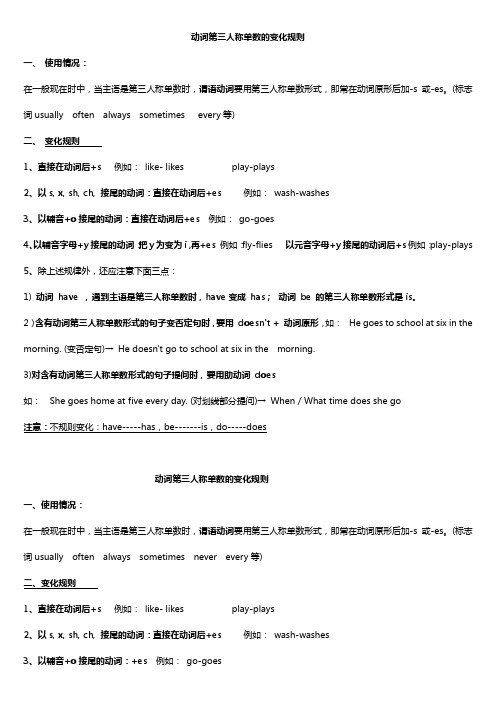
动词第三人称单数的变化规则一、使用情况:在一般现在时中,当主语是第三人称单数时,谓语动词要用第三人称单数形式,即常在动词原形后加-s或-es。
(标志词usually often always sometimes every等)二、变化规则1、直接在动词后+s 例如:like- likes play-plays2、以s, x, sh, ch, 接尾的动词:直接在动词后+es 例如:wash-washes3、以辅音+o接尾的动词:直接在动词后+es 例如:go-goes4、以辅音字母+y接尾的动词:把y为变为i,再+es 例如:fly-flies 以元音字母+y接尾的动词后+s例如:play-plays5、除上述规律外,还应注意下面三点:1)动词have ,遇到主语是第三人称单数时,have变成has;动词be 的第三人称单数形式是is。
2)含有动词第三人称单数形式的句子变否定句时,要用doesn't + 动词原形,如:He goes to school at six in the morning. (变否定句)→He doesn't go to school at six in the morning.3)对含有动词第三人称单数形式的句子提问时,要用助动词does如:She goes home at five every day. (对划线部分提问)→When / What time does she go注意:不规则变化:have-----has,be-------is,do-----does动词第三人称单数的变化规则一、使用情况:在一般现在时中,当主语是第三人称单数时,谓语动词要用第三人称单数形式,即常在动词原形后加-s或-es。
(标志词usually often always sometimes never every等)二、变化规则1、直接在动词后+s 例如:like- likes play-plays2、以s, x, sh, ch, 接尾的动词:直接在动词后+es 例如:wash-washes3、以辅音+o接尾的动词:+es 例如:go-goes4、以辅音字母+y接尾的动词:把y变为i,再+es 例如:fly-flies 以元音字母+y接尾的动词后+s例如:play-plays5、除上述规律外,还应注意下面三点:1)动词have ,遇到主语是第三人称单数时,have变成has;动词be 的第三人称单数形式是is。
动词第三人称单数的变化规则及练习

一.动词第三人称单数的变化规则1、大多数动词在词尾加“S”在清辅音后发音为[s],在浊辅音及元音后发音为[z]。
如:①stop-stops [s] ; make-makes [s]2、以辅音字母加“y”结尾的,要先将“y”变为“i”,然后在加“es”读[iz] 如:fly-flies [z];carry-carries [z]3、以“s, x, ch, sh”结尾的,在词尾加“es”,发音为[iz] 如:teach-teaches [iz]; watch-watches [iz]4、以“o”结尾的动词,加“es”,读[z] 如:go-goes [z]二.动词变现在分词的变化规则:1. 直接在动词原形后面加-ing。
如:read – reading cook – cooking talk– talking2.以不发音的字母e结尾的动词把e去掉加-ing。
如:write → writing make → making3.以一个辅音字母加一个元音字母结尾的重读闭音节单词, 要双写最后一个辅音字母再加-ing。
如:run → running cut → cutting swim → swimming5)以ie结尾的动词,把ie改为y ,再加ingdie---dying lie---lying动词第三人称单数的变化规则及练习一.写出下列动词的第三人称单数。
drink ________ go _______ stay ________ make ________ look______ have_______ pass_______carry_______ come______ watch______ plant_______ fly________ study_______ brush________ teach_______二.用括号内动词的适当形式填空。
1. He often ________(have) dinner at home.2. Daniel and Tommy _______(be) in Class One.3. We _______(not watch) TV on Monday.4. Nick _______(not go) to the zoo on Sunday.5. ______ they ________(like) the World Cup?6. What _______they often _______(do) on Saturdays?7. _______ your parents _______(read) newspapers every day?8. The girl _______(teach) us English on Sundays.9. She and I ________(take) a walk together every evening.10. There ________(be) some water in the bottle.11. Mike _______(like) cooking. 12. They _______(have) the same hobby.13. My aunt _______(look) after her baby carefully.14. You always _______(do) your homework well.15. I _______(be) ill. I’m stayin g in bed.16. She _______(go) to school from Monday to Friday.17. Liu Tao _______(do) not like PE.18. The child often _______(watch) TV in the evening.19. Su Hai and Su Yang _______(have) eight lessons this term.20. -What day _______(be) it today? -It’s Saturday.三、按照要求改写句子。
动词三单变化规则与练习
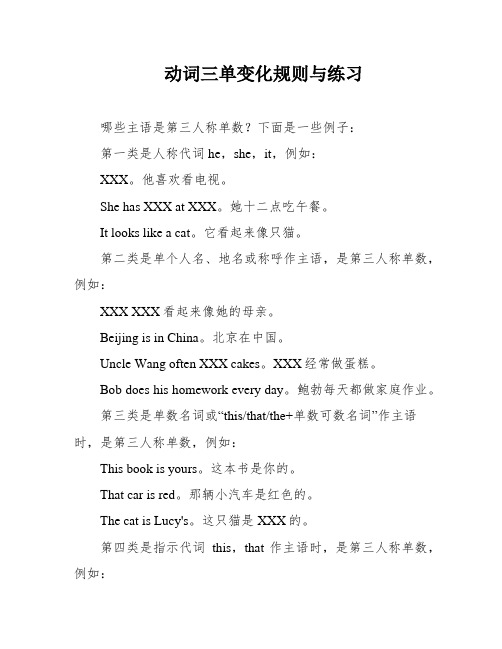
动词三单变化规则与练习哪些主语是第三人称单数?下面是一些例子:第一类是人称代词he,she,it,例如:XXX。
他喜欢看电视。
She has XXX at XXX。
她十二点吃午餐。
It looks like a cat。
它看起来像只猫。
第二类是单个人名、地名或称呼作主语,是第三人称单数,例如:XXX XXX看起来像她的母亲。
Beijing is in China。
北京在中国。
Uncle Wang often XXX cakes。
XXX经常做蛋糕。
Bob does his homework every day。
鲍勃每天都做家庭作业。
第三类是单数名词或“this/that/the+单数可数名词”作主语时,是第三人称单数,例如:This book is yours。
这本书是你的。
That car is red。
那辆小汽车是红色的。
The cat is Lucy's。
这只猫是XXX的。
第四类是指示代词this,that作主语时,是第三人称单数,例如:This is a pen。
这是一支钢笔。
That is an XXX。
那是一块橡皮擦。
动词第三人称单数的变化规则如下:1.直接在动词后+s,例如like-likes,play-plays。
2.以s,x,sh,ch接尾的动词+es,例如wash-washes。
3.以辅音+o接尾的动词,+es,例如go-goes。
4.以辅音+y接尾的动词,变y为i+es,例如fly-flies,study-studies。
注意:动词三单特殊形式,例如go-goes,do-does,have-has,be-is。
练题:(三单形式)1.works2.watches3.cleans4.writes5.XXX6.washes7.has8.reads9.goes10.does11.flies12.studies13.XXX.(注意主语是第三人称单数,应该用watches)。
I watch TV.(注意主语是第一人称单数,应该用watch)。
动词第三人称单数的变化规则及练习

动词汇第三人称单数的变更准则及训练之阳早格格创做一、变更准则1、曲交正在动词汇后+s比圆: like likes playplays2、以s, x, sh, ch, 交尾的动词汇:+es比圆: washwashes3、以辅音+o交尾的动词汇:+es比圆: gogoes4、以辅音+y交尾的动词汇:变y为i+es比圆: flyflies动词汇短语:+s: Plays, skips, sings, gives, starts, likes,buys some toys, gets up comes back homemakes noodles, eats lunch drinks coffeebegins his class , practises the piano+es : watches TV brushes his teethgoes to bed goes to schooldoes my homework does some readingy→ i+ es:fly → flies study →studies注意:没有准则变更:havehas,beis,dodoes写出下列动词汇的第三人称单数drink ________ go _______ stay ________ make ________ look _________ have_______ pass_______ carry ____ come________ watch______ plant_______ fly ________ study_______ brush________ do_________ teach_______二、请瞅底下二组句子,注意区别他们的共共面战分歧面.I go to school every day.I don't go to school every day.He goes to school every day.He doesn't go to school every day.Do you go to school every day?Yes, I do. (No, I don't)Does he go to school every day?Yes, he does. (No, he doesn't)注:1)第三人称单数用了 does 后里便没有必动词汇的s形式了,而用动词汇本形..2)形成疑问句,要正在句尾加"do" does ; 形成可定句, 要正在动词汇前里加"do not ,does not", 不妨简写为"don't", doesn’t.课堂训练一一、把下列句子改成普遍疑问句并干肯定、可定回问.1.I usually get up at six o’clock.Do you usually get up at six ?Yes, I do . /No, I don’t .2. We usually write emails on Saturday evening?Yes,No,3. They have the same hobby.?Yes,No,4.Suhai and Su yang like listening to music after school.?Yes,No,5.Helen usually watches TV in the evening.?Yes,No,二、可定句:正在动词汇前+doesn't或者don't.1.She_____ _____(do)her homework every day.2.He_____ _____(live)in Huanggang.3.The girl_____ _____(look)out of the window and sees many birds in the sky.4.Jenny runs home and_____ _____(sit)on the chair.三、普遍疑问句:1._____the desk_____(have)four legs? Yes,it does.2._____she____(do)her homework every day?Yes,she does.3._____he_____(live)in Huanggang? No,he doesn't.4.Does Danny_____(see)the apple tree?四、依照央供改写句子:1. I do my homework every day.(改为普遍疑问句,做可定回问) ___________________________________________________ _____2. She likes milk.(改为普遍疑问句,做肯定回问) ___________________________________________________ _________3. Amy likes playing computer games.(改为普遍疑问句,做可定回问) ___________________________________________________4. We go to school every morning.(改为可定句) ___________________________________________________ ____5. I like taking photos in the park.(对于划线部分提问) ___________________________________________________ _____6. John comes from Canada.(对于划线部分提问) ___________________________________________________7. Simon and Daniel like going skating.(改为可定句)___________________________________________________五、改错(划堕落误的场合,将精确的写正在横线上)1. Is your brother speak English? __________________2. Does he like going fishing? __________________3. He likes play games after class. __________________4. Mr. Wu teaches us English. __________________5. She doesn’t do her homework on Sundays. _________________课堂训练二一、写出所给词汇的第三人称单数形式sitswimread makerunwritehavegodowatch crystudyplaysaywash二、用do或者does的适合形式挖空1. _____ you ride a bike to school? Yes, I ________.2. ______ your sister like PE? No, she ________.3. What_______ the students have? They have some pens.4. How_______ Linda go to school? She goes to school on foot.5. He _______ not speak English. He speaks Chinese.6. _______ they watch TV on Sundays? Yes, they _______.7. My father and mother ______ not read newspapers on Saturday.三、句型变换1. I go to school by bus. (用He干主语变可定句)________________________________________2. Kim plays baseball very well. (变普遍疑问句)________________________________________3. David doesn’t like learning French. (变肯定句)________________________________________4. Alan doesn’t watch TV on school nights. (变肯定句)________________________________________5. We have enough time to do it. (变可定句)________________________________________6. Snoopy has a car. (对于划线部分提问)__________________________________________________________ ____7. Do you have a pencil? (把主语改成she)____________________________________________________________ ____四、动词汇的适合形式挖空Jim’s father (work) in a bank.He (go) to work by bus every morning, sometimes he (ride) his bike.But he (be) never late for work. He (work) very hard.Jim (like) his father very much. They often(play) badminton (羽毛球)in front of their house, sometimes they (play) table tennis in Jim’s school.Jim (like) to talk with his father. His father(like) to hear Jim talking about his friends and his school. On Saturday or Sunday, they often(play) on the computer. Jim (have) many computer games. But he doesn’t (play) them every day. He also (work) hard at his lessons.。
动词三单规律

动词三单规律动词的三单规律是英语语法中的一个重要规则,它指的是在句子中,当主语为第三人称单数时,动词需做相应的变化。
下面将详细介绍这一规律,并提供一些例句来帮助理解。
一、动词三单规律概述在英语中,当主语为第三人称单数时,动词的形式会发生变化。
一般情况下,动词在第三人称单数时在词尾加上“-s”或“-es”。
但也有一些特殊情况需要注意,例如以“-s”、“-sh”、“-ch”或“-x”结尾的动词,需要在词尾加上“-es”。
二、动词三单规律示例1. 一般情况下,动词在第三人称单数时加上“-s”。
- He writes a novel every year.(他每年写一本小说。
)- She sings beautifully.(她唱得很好听。
)- The cat sleeps on the sofa.(猫在沙发上睡觉。
)2. 以“-s”、“-sh”、“-ch”或“-x”结尾的动词,在第三人称单数时加上“-es”。
- He kisses his wife goodbye every morning.(他每天早上吻别妻子。
)- She washes her clothes on weekends.(她周末洗衣服。
)- The fox catches the rabbit.(狐狸捉住了兔子。
)3. 以辅音字母+y结尾的动词,在第三人称单数时变为“-ies”。
- He studies English every day.(他每天学习英语。
)- She flies to London next week.(她下周飞往伦敦。
)4. 以元音字母+y结尾的动词,在第三人称单数时加上“-s”。
- He plays basketball with his friends.(他和朋友们一起打篮球。
)- She enjoys reading books.(她喜欢读书。
)5. 一些不规则动词在第三人称单数时发生特殊变化。
- He has a car.(他有一辆车。
动词单三变化规律及练习题(小学五年级)
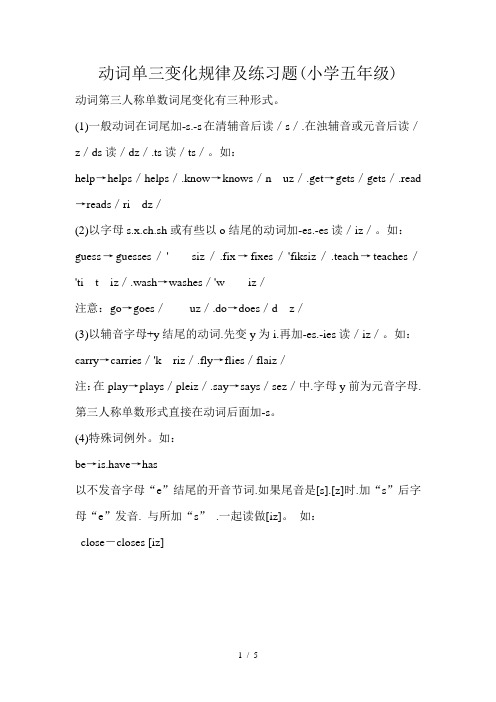
动词单三变化规律及练习题(小学五年级)动词第三人称单数词尾变化有三种形式。
(1)一般动词在词尾加-s.-s在清辅音后读/s/.在浊辅音或元音后读/z/ds读/dz/.ts读/ts/。
如:help→helps/helps/.know→knows/n uz/.get→gets/gets/.read →reads/ri dz/(2)以字母s.x.ch.sh或有些以o结尾的动词加-es.-es读/iz/。
如:guess→guesses/'siz/.fix→fixes/'fiksiz/.teach→teaches/'ti t iz/.wash→washes/'w iz/注意:go→goes/uz/.do→does/d z/(3)以辅音字母+y结尾的动词.先变y为i.再加-es.-ies读/iz/。
如:carry→carries/'k riz/.fly→flies/flaiz/注:在play→plays/pleiz/.say→says/sez/中.字母y前为元音字母.第三人称单数形式直接在动词后面加-s。
(4)特殊词例外。
如:be→is.have→has以不发音字母“e”结尾的开音节词.如果尾音是[s].[z]时.加“s”后字母“e”发音. 与所加“s”.一起读做[iz]。
如:close-closes [iz]一般现在时练习(一)一、用词的适当形式填空1.What time_________ his father_________(do) the work?2.He _________(get) up at five o’clock.3.__________ you _________(brush) your teeth every morning?4.What ________ ( do ) he usually ________( do ) after school?5.Tom ________ ( study ) English, Chinese, Maths, Science and Art at school.6. Kitty sometimes __________(go) to the park with his sister.7.At eight at night, she __________( watch ) TV with her parents.8. ________ Mike________( read ) English every day?9.How many lessons________ your classmates______( have ) on Monday?10.We often___________ ( play ) football in the playground.二、选择() 1. _____ you have a book?A. DoB. AreC. IsD. Have()2. They _________ on a farm.A. workingB. is workC. workD. is worked() 3. Does Peter like to watch TV?__________.A. Yes, he likeB. No, he doesn’tC. Yes, he’d likeD. No, he likes ()4. She doesn’t __________ her homework in the afternoon.A. doingB. to doC. doesD. do()5. How ____________ Mr. Brown ___________ to America?A. do,goB. is,goC. does,goD. does,goes()6. Where’s my camera? I____________ it.A. am not findingB. am not seeingC. can’t findD. can’t look at ()7. How ___________ he go to work?He ___________ to work by bike.A. does ;goB. do;goesC. do ;goD. does;goes()8. ______ you usually late for school?No, _____________.A. Do ; I amB. Does ;notC. Are ; I’m notD. Are ; I aren’t()9. _____ she _____ home at six every day?A. Is , leaveB. Does , leaveC. Is , leavesD. Does , left()10. Mr. Yang ____________ English this term.A.teaches ourB. teaches usC. teachs usD. teach our一般现在时练习(二)一、单项选择题1. Jenny ____ in an office. Her parents ____in a hospital.A. work worksB. works workC. work are workingD. is working work2. One of the boys_____ a black hat.A. haveB. there isC. there areD. has3. We will go shopping if it____ tomorrow.A. don't rainB. didn't rainC. doesn't rainD. isn't rain4. He said the sun ____in the east and ____in the west.A. rose; setB. rises; setsC. rises; setD. rise; sets5. Wang Mei ____ music and often ____ to music.A. like; listenB. likes; listensC. like; are listeningD. liking; listen6. Jenny____ English every evening.A. has studyB. studiesC. studyD. studied7. _____Mike from Japan?A. AreB. DoC. DoesD.IsA. AreB. DoC. DoesD.Is9. What language do you_______?A. sayB. talkC. tellD. speak10. The elephant likes______her friends and _____grass.A. play with; eatB. play with; eatsC. to play with; eatD. to play with; eats二、所给动词的正确形式填空2. _____your sister_____(know)English?3. Her home____ (be) away from her school.4. The pot_____(not look) like yours very much.5. Where _____you____(have)lunch every day?6. Who_____(want)to go swimming?7. ______she_____(do) the housework every day?8. Jenny and Danny usually______(play) games in the afternoon .9. ______you ______(like) English?10. What______his father_____(do) ?。
7年级上册行为动词第三人称单数的变化规则及练习各版本通用
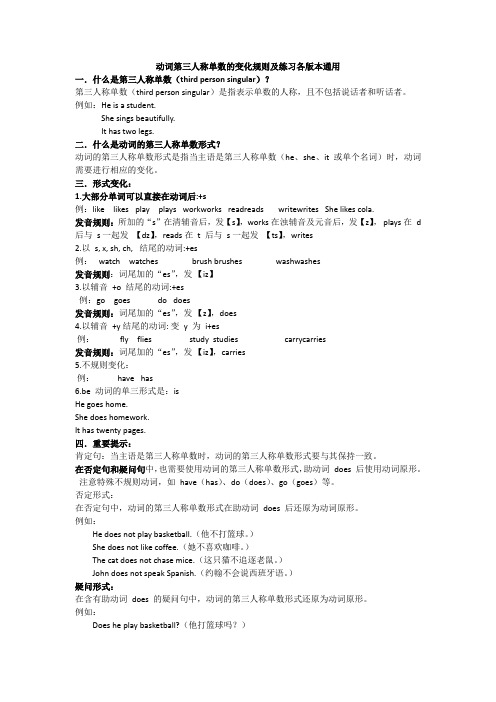
动词第三人称单数的变化规则及练习各版本通用一.什么是第三人称单数(third person singular)?第三人称单数(third person singular)是指表示单数的人称,且不包括说话者和听话者。
例如:He is a student.She sings beautifully.It has two legs.二.什么是动词的第三人称单数形式?动词的第三人称单数形式是指当主语是第三人称单数(he、she、it 或单个名词)时,动词需要进行相应的变化。
三.形式变化:1.大部分单词可以直接在动词后:+s例:like likes play plays workworks readreads writewrites She likes cola.发音规则:所加的“s”在清辅音后,发【s】,works在浊辅音及元音后,发【z】,plays在d 后与s一起发【dz】,reads在t 后与s一起发【ts】,writes2.以s, x, sh, ch, 结尾的动词:+es例:watch watches brush brushes washwashes发音规则:词尾加的“es”,发【iz】3.以辅音+o 结尾的动词:+es例:go goes do does发音规则:词尾加的“es”,发【z】,does4.以辅音+y结尾的动词:变y 为i+es例:fly flies study studies carrycarries发音规则:词尾加的“es”,发【iz】,carries5.不规则变化:例:have has6.be 动词的单三形式是:isHe goes home.She does homework.It has twenty pages.四.重要提示:肯定句:当主语是第三人称单数时,动词的第三人称单数形式要与其保持一致。
在否定句和疑问句中,也需要使用动词的第三人称单数形式,助动词does 后使用动词原形。
动词第三人称单数的变化规则及练习

动词第三人称双数的变动规则及练习之马矢奏春创作一、二、变动规则1、直接在动词后+s例如: like likes playplays2、以s, x, sh, ch, 接尾的动词:+es例如: washwashes3、以辅音+o接尾的动词:+es例如: gogoes4、以辅音+y接尾的动词:变y为i+es例如: flyflies动词短语:+s: Plays, skips, sings, gives, starts, likes,buys some toys, gets up comes back homemakes noodles, eats lunch drinks coffeebegins his class , practises the piano+es : watches TV brushes his teethgoes to bed goes to schooldoes my homework does some readingy→ i+ es:fly → flies study →studies注意:不规则变动:havehas,beis,dodoes写出下列动词的第三人称双数drink ________ go _______ stay ________ make ________ look _________ have_______ pass_______ carry ____ come________ watch______ plant_______ fly ________ study_______ brush________ do_________ teach_______二、请看下面两组句子,注意区分他们的共同点和分歧点.I go to school every day.I don't go to school every day.He goes to school every day.He doesn't go to school every day.Do you go to school every day?Yes, I do. (No, I don't)Does he go to school every day?Yes, he does. (No, he doesn't)注:1)第三人称双数用了 does 后面就不用动词的s形式了,而用动词原形..2)酿成疑问句,要在句首加"do" does ; 酿成否定句, 要在动词前面加"do not ,does not", 可以简写为"don't", doesn’t.课堂练习一一、把下列句子改成一般疑问句并做肯定、否定回答.1.I usually get up at six o’clock.Do you usually get up at six ?Yes, I do . /No, I don’t .2. We usually write emails on Saturday evening?Yes,No,3. They have the same hobby.?Yes,No,4.Suhai and Su yang like listening to music after school.?Yes,No,5.Helen usually watches TV in the evening.?Yes,No,二、否定句:在动词前+doesn't或don't.1.She_____ _____(do)her homework every day.2.He_____ _____(live)in Huanggang.3.The girl_____ _____(look)out of the window and sees many birds in the sky.4.Jenny runs home and_____ _____(sit)on the chair.三、一般疑问句:1._____the desk_____(have)four legs? Yes,it does.2._____she____(do)her homework every day?Yes,she does.3._____he_____(live)in Huanggang? No,he doesn't.4.Does Danny_____(see)the apple tree?四、依照要求改写句子:1. I do my homework every day.(改为一般疑问句,作否定回答) ________________________________________________________ 2. She likes milk.(改为一般疑问句,作肯定回答) _________________________________________________________ ___3. Amy likes playing computer games.(改为一般疑问句,作否定回答) ___________________________________________________4. We go to school every morning.(改为否定句) _______________________________________________________5. I like taking photos in the park.(对划线部份提问) ________________________________________________________6. John comes from Canada.(对划线部份提问) ___________________________________________________7. Simon and Daniel like going skating.(改为否定句) ___________________________________________________五、改错(划犯毛病的处所,将正确的写在横线上)1. Is your brother speakEnglish? __________________ 2. Does he like going fishing? __________________ 3. He likes play games after class. __________________ 4. Mr. Wu teaches us English. __________________ 5. She doesn’t do her homework on Sundays. _________________课堂练习二一、写出所给词的第三人称双数形式sitswimread makerunwritehavegodowatch crystudyplaysaywash二、用do或does的适当形式填空1. _____ you ride a bike to school? Yes, I ________.2. ______ your sister like PE? No, she ________.3. What_______ the students have? They have some pens.4. How_______ Linda go to school? She goes to school on foot.5. He _______ not speak English. He speaks Chinese.6. _______ they watch TV on Sundays? Yes, they _______.7. My father and mother ______ not read newspapers onSaturday.三、句型转换1. I go to school by bus. (用He做主语变否定句)________________________________________2. Kim plays baseball very well. (变一般疑问句)________________________________________3. David doesn’t like learning French. (变肯定句)________________________________________4. Alan doesn’t watch TV on school nights. (变肯定句) ________________________________________5. We have enough time to do it. (变否定句)________________________________________6. Snoopy has a car. (对划线部份提问)______________________________________________________________ 7. Do you have a pencil? (把主语改成she)________________________________________________________________四、动词的适当形式填空Jim’s father(work) in a bank.He (go) to work by bus every morning, sometimes he (ride) his bike.But he (be) never late for work. He (work) very hard. Jim (like) his father very much. They often(play)badminton(羽毛球)in front of their house, sometimes they (play) table tennis in Jim’s school.Jim (like) to talk with his father. His father(like) to hear Jim talking about his friends and his school. On Saturday or Sunday, they often(play) on the computer. Jim (have) many computer games. But he doesn’t (play) them every day. He also (work) hard at his lessons.。
- 1、下载文档前请自行甄别文档内容的完整性,平台不提供额外的编辑、内容补充、找答案等附加服务。
- 2、"仅部分预览"的文档,不可在线预览部分如存在完整性等问题,可反馈申请退款(可完整预览的文档不适用该条件!)。
- 3、如文档侵犯您的权益,请联系客服反馈,我们会尽快为您处理(人工客服工作时间:9:00-18:30)。
--
动词三单的变化规则及练习
规则:
1.一般情况下,直接加-s ,如: cook-cooks, milk-milks
2.以 s. x. sh. ch. o 结尾,加-es ,如:guess-guesses, wash-washes, watch-watches, go-goes
3.以“辅音字母 +y”结尾,变 y 为 i, 再加 -es ,如:study-studies
练习 : 写出下列动词的第三人称单数 (60 ’)
drink ________ go _______ stay ________ make ________
look _________ have_______ pass_______ carry ________
come________ watch______ plant_______ fly ________
study_______ brush________ teach_______
填空: (40’)
1.He often ________(have) dinner at home.
2.Daniel and Tommy _______(be) in Class One.
3.We _______(not watch) TV on Monday.
4.Nick _______(not go) to the zoo on Sunday.
5.______ they ________(like) the World Cup?
6.What _______they often _______(do) on Saturdays?
7._______ your parents _______(read) newspapers every day?
8.The girl _______(teach) us English on Sundays.
9.She and I ________(take) a walk together every evening.
10.There ________(be) some water in the bottle.
11.Mike _______(like) cooking.
12.They _______(have) the same hobby.
13.My aunt _______(look) after her baby carefully.
14.You always _______(do) your homework well.
15. I _______(be) ill. I ’ m staying in bed.
16.She _______(go) to school from Monday to Friday.
17.Liu Tao _______(do) not like PE.
18.The child often _______(watch) TV in the evening.
19.Su Hai and Su Yang _______(have) eight lessons this term.
20.-What day _______(be) it today? - It ’ s Saturday.
--。
